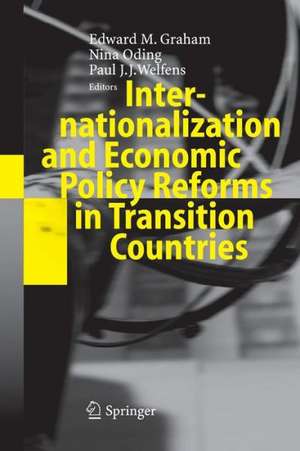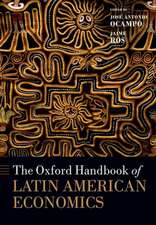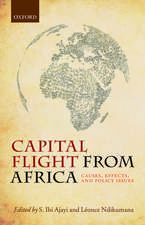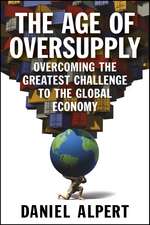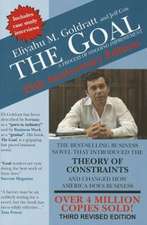Internationalization and Economic Policy Reforms in Transition Countries
Editat de Edward M. Graham, Nina Oding, Paul J.J. Welfensen Limba Engleză Paperback – 22 noi 2014
| Toate formatele și edițiile | Preț | Express |
|---|---|---|
| Paperback (1) | 643.34 lei 6-8 săpt. | |
| Springer Berlin, Heidelberg – 22 noi 2014 | 643.34 lei 6-8 săpt. | |
| Hardback (1) | 648.42 lei 6-8 săpt. | |
| Springer Berlin, Heidelberg – 21 aug 2005 | 648.42 lei 6-8 săpt. |
Preț: 643.34 lei
Preț vechi: 756.86 lei
-15% Nou
Puncte Express: 965
Preț estimativ în valută:
123.10€ • 128.87$ • 101.86£
123.10€ • 128.87$ • 101.86£
Carte tipărită la comandă
Livrare economică 05-19 aprilie
Preluare comenzi: 021 569.72.76
Specificații
ISBN-13: 9783642421471
ISBN-10: 3642421474
Pagini: 356
Ilustrații: XI, 344 p.
Dimensiuni: 155 x 235 x 19 mm
Greutate: 0.5 kg
Ediția:2005
Editura: Springer Berlin, Heidelberg
Colecția Springer
Locul publicării:Berlin, Heidelberg, Germany
ISBN-10: 3642421474
Pagini: 356
Ilustrații: XI, 344 p.
Dimensiuni: 155 x 235 x 19 mm
Greutate: 0.5 kg
Ediția:2005
Editura: Springer Berlin, Heidelberg
Colecția Springer
Locul publicării:Berlin, Heidelberg, Germany
Public țintă
ResearchDescriere
Edward M. Graham, Nina Oding and Paul J. J. Welfens Eastern Europe and the former Soviet Union have achieved sustained economic growth in first half of the new decade in the 2V^ century. EU ac cession countries which have joined the EU have benefited mainly from high capital inflows, a reduced risk premium - with shadow effects of this already occurring in the years before explicit membership - and growing trade. While system transformation has undermined trade between Eastern Europe and Russia for several years there are medium prospects for grow ing trade in the whole of Europe. Russia's case, however, is different from the EU accession countries as a major driving force of economic dynamics is the oil and gas sector which has considerable backward and forward linkages. At the same time this sector apparently is politically quite sensi tive. The Transatlantic Transformation and Economic Development Re search Group has organized several workshops within a major interna tional research project. The project is devoted to analyzing the internatio nalization of the Russian economy and the associated changes in major policy fields. This book contains the revised analytical papers from the St. Petersburg conference in 2003 when the city celebrated its 300 year anniversary. We are very grateful to the Leontief Center for excellent organization of the conference. The paper by Paul J. J.
Cuprins
Structural Change, Natural Resources Sector Expansion and Growth in Russia.- Comment on: Structural Change, Natural Resource Sector Expansion and Growth in Russia.- Monetary and Financial Stability as a Basis for Russia's Sustained Economic Internationalization.- Comment on: Monetary and Financial Stability as a Basis for Russia's Sustained Economic Internationalization.- Core Inflation in Russia — Different Approaches for the Period from January 1997 to April 2003.- Comment on: Core Inflation in Russia — Different Approaches for the Period from January 1997 to April 2003.- Russia's Banking System, the Central Bank and the Exchange Rate Regime.- Russia and International Economic Structures.- Comment on: Russia and International Economic Structures.- An Increase of Energy Efficiency as a Major Tool for Achieving Energy Security.- European Energy Security: Opportunities and Problems for Cooperation EU-Russia.- Diversification of the Russian Economy and Growth.- Internationalization of Russian Regions: The Role of MNCs and Outsourcing with Respect to Domestic and Foreign SMEs.- Comment on: Internationalization of Russian Regions: The Role of MNCs and Outsourcing with Respect to Domestic and Foreign SMEs.- Do Export Processing Zones Attract FDI and its Benefits? Experience from China and Lessons for Russia.- Comment on: Do Export Processing Zones Attract FDI and its Benefits? Experience from China and Lessons for Russia.- The Baltic Sea Regional Integration and International Trade: A Gravity Model Approach.- Comment on: The Baltic Sea Regional Integration and International Trade: A Gravity Model Approach.- Russia's Foreign Economic Relations and Regional Integration in CIS Countries: Theory, Problems and Options.- Comment on: Russia's Foreign Economic Relations and Regional Integration in CIS Countries: Theory, Problems and Options.
Caracteristici
Includes supplementary material: sn.pub/extras
